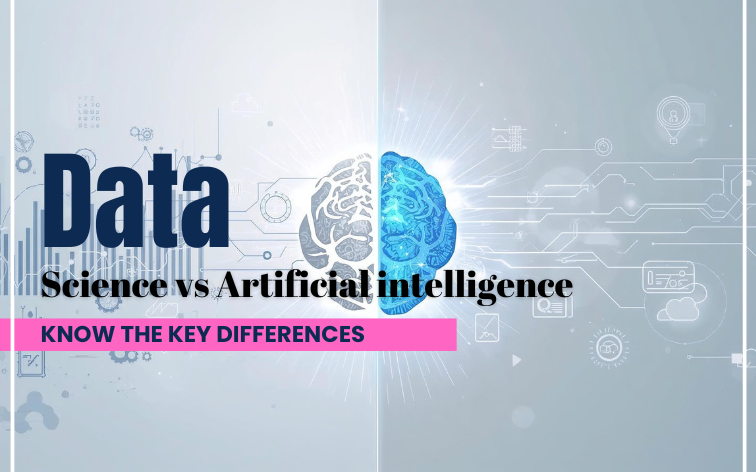
Data Science and Artificial Intelligence are two most exciting areas in the tech world. Technology is geared towards rapid advancement is a well-known fact. Typically, it is often confused between these domains, but they serve distinct purposes. These technologies deal with huge amounts of data, but the way they process it is different. The main difference between data science and artificial intelligence is that data science extracts insights from the data to make smarter decisions, while artificial intelligence builds intelligent machines that can simulate human cognition, learning, and problem-solving abilities. In this article, you will get key differences between data science and artificial intelligence, which can clear your confusions and highlight where you should focus on.
What is Data Science?

Data science is the art and science of extracting meaningful insights from raw data to drive smarter business decisions. Think of data scientists as digital detectives who sift through vast amounts of information to uncover patterns, trends, and actionable intelligence that can transform how organizations operate and compete. The primary goal of data scientists is to harness the power of data for business improvement, helping companies understand their customers better, optimize operations, and predict future trends. This field is the best choice for the students who like to deal with the data and grab the meaningful insights for the betterment of any industry.
Key components of Data Science
Data science operates through several interconnected components that work together to transform raw data into valuable insights:
- Data Collection and Cleaning: Gathering data from various sources and preparing it for analysis by removing inconsistencies and errors
- Statistical Analysis: Applying mathematical and statistical methods to identify patterns and relationships within datasets
- Data Visualization: Creating charts, graphs, and interactive dashboards to communicate findings effectively
- Machine Learning: Implementing algorithms to make predictions and automate decision-making processes
- Business Intelligence: Translating technical findings into actionable business strategies and recommendations
Applications of Data Science
Data science has revolutionized numerous industries by providing data-driven solutions to complex business challenges:
- Healthcare: Predicting disease outbreaks, personalizing treatment plans, and optimizing hospital operations
- Finance: Fraud detection, risk assessment, algorithmic trading, and credit scoring
- Retail and E-commerce: Customer segmentation, recommendation systems, inventory optimization, and price optimization
- Marketing: Campaign effectiveness analysis, customer lifetime value prediction, and targeted advertising
- Transportation: Route optimization, demand forecasting, and autonomous vehicle development
What is Artificial Intelligence?

Artificial intelligence strives to design computer systems that think and act like humans simulating human intelligence. It develops machines that perform tasks which normally require human cognitive abilities such as reasoning, learning, perception, and decision-making. Unlike data science, which primarily focuses on extracting insights from existing data, AI aims to create systems that can independently process information, learn from experience, and make intelligent decisions. Its power lies in developing intelligent systems that require very minimal human intervention. This possibility can lead to improved productivity with minimal errors.
Key components of Artificial Intelligence
AI covers various technologies and methodologies that work together to create intelligent systems:
- Machine Learning: Algorithms that enable systems to learn and improve from experience without explicit programming
- Deep Learning: Advanced neural networks that can process complex data patterns, mimicking human brain functionality
- Natural Language Processing (NLP): Technology that enables machines to understand, interpret, and generate human language
- Computer Vision: Systems that can interpret and analyze visual information from images and videos
- Robotics: Integration of AI with physical systems to create intelligent machines that can interact with the physical world
Applications of Artificial Intelligence
AI has found applications across virtually every industry, transforming how we work and live:
- Autonomous Vehicles: Self-driving cars that can navigate roads, interpret traffic signals, and make split-second decisions
- Virtual Assistants: Siri, Alexa, and Google Assistant that can understand voice commands and perform tasks
- Healthcare Diagnostics: AI systems that can analyze medical images, predict patient outcomes, and assist in diagnosis
- Gaming and Entertainment: AI-powered game characters, content recommendation systems, and personalized entertainment experiences
- Cybersecurity: Intelligent systems that can detect and respond to security threats in real-time
What are the Key Differences Between Data Science and Artificial Intelligence
While data science and AI share some common ground, they differ significantly in their objectives, methodologies, and outcomes. Let’s understand the factors that differentiates these technological domains:
Scope and Application
Data science operates within a more specialized scope, focusing on extracting meaningful insights from existing data to inform strategic business decisions. Data scientists work within specific parameters, addressing targeted business questions such as “Why did sales decline last quarter?” or “Which customers are most likely to churn?” Their work is typically bounded by available datasets and focuses on understanding patterns, trends, and correlations that can guide immediate business actions. The scope often involves retrospective analysis, current state assessment, and predictive modeling for specific use cases.
Artificial intelligence covers a significantly broader and more ambitious scope, extending beyond data analysis to create intelligent systems capable of autonomous operation across diverse domains. AI applications range from simple recommendation engines to complex autonomous vehicles, from natural language chatbots to sophisticated robotic systems that can perform physical tasks. Unlike data science’s focused approach to specific business questions, AI aims to replicate and often exceed human cognitive abilities across multiple scenarios, creating solutions that can adapt, learn, and improve independently over time.
Career Options
Professionals who master data science skills can pursue several rewarding career options. Data Analysts focus on interpreting data and creating reports to help businesses understand their performance and market trends. Data Scientists take a more advanced approach, developing complex models and algorithms to solve business problems and predict future outcomes. Business Analysts bridge the gap between technical data insights and business strategy, helping organizations translate data findings into actionable business decisions.
AI professionals can explore diverse and rapidly growing career opportunities. AI Engineers design, develop, and deploy intelligent systems and algorithms that can perform complex tasks autonomously. Robotics Engineers combine AI with mechanical engineering to create intelligent robots for various applications, from manufacturing to healthcare. NLP Specialists focus on developing systems that can understand and process human language, working on applications like chatbots, translation services, and voice assistants.
Skills to be Learned
For Data Science, you need to master SQL for manipulating and querying databases, Java for handling big data processing, and machine learning techniques for implementing predictive algorithms. Statistical modeling is essential for making accurate predictions and understanding data relationships. The field also demands expertise in big data technologies and hands-on experience with specialized tools. Essential tools include Scikit-learn for machine learning implementation, SciPy for scientific computing, Matplotlib and Seaborn for creating compelling data visualizations, and Excel for basic data analysis and reporting.
For AI engineering roles, you need expertise in multiple programming languages including C, C++, and Java, depending on the specific application requirements. Familiarity with various machine learning and deep learning frameworks is crucial for developing sophisticated AI models. Additionally, modern AI engineers must understand deployment and scaling technologies such as Docker for containerization, Kubernetes for orchestration, AWS for cloud computing, and Apache Hadoop for handling large-scale distributed data processing.
Work Scope of the Professionals
Data Scientists focus on understanding business performance and trends through data analysis. They spend significant time cleaning messy, unstructured data, transforming it into usable formats for analysis. Their work involves running statistical analyses, creating insightful visualizations, and crafting compelling narratives that translate complex technical findings into understandable insights for non-technical stakeholders like managers and product development teams.
AI engineers concentrate on building and deploying intelligent models that can automate processes in real-time. Their responsibilities include designing AI architectures, training machine learning models, optimizing system performance, and ensuring that AI solutions integrate seamlessly with existing business processes. They work on creating systems that can operate independently and continuously improve through learning algorithms.
Job Market Trends
The job market landscape for data science and AI is experiencing significant shifts that reflect the evolving needs of modern businesses. Data science positions are experiencing a decline as the market becomes saturated with professionals possessing basic analytical skills. However, this doesn’t indicate reduced importance but rather an advancement of the field where employers now seek more specialized expertise.
Conversely, AI engineering jobs are experiencing explosive growth as companies recognize the transformative potential of artificial intelligence. Organizations are shifting their focus toward AI and generative AI technologies, fundamentally changing hiring expectations. Companies now prioritize candidates who can not only analyze data but also build intelligent systems that can operate autonomously and deliver continuous value.
Also read: Difference between AI and Machine Learning
Summary: Data Science vs Artificial Intelligence
Here are the list of differences between data science and artificial intelligence in a single snapshot:
Aspect | Data Science | Artificial Intelligence |
Primary Goal | Extract insights from data for decision-making | Create intelligent systems that simulate human cognition |
Focus | Data analysis and interpretation | Building autonomous intelligent systems |
Methodology | Statistical analysis, data mining, visualization | Machine learning, deep learning, neural networks |
Career Growth | Stable with specialization requirements | Rapidly growing with high demand |
Industry Application | Business intelligence and analytics | Automation and intelligent decision-making |
Salary (Average) | Competitive, slightly lower than AI (varies by role & location) | Higher on average due to demand for specialized AI expertise |
Major Skills | Statistics, SQL, Python/R, data visualization, business acumen | Machine learning, deep learning, programming (Python, C++), neural networks |
Future Prospects | Strong demand in analytics, finance, healthcare, and business roles | Explosive growth in robotics, automation, self-driving, generative AI systems |
Where Data Science and Artificial Intelligence Meets?
The boundary between data science and artificial intelligence is not rigidly defined, and these fields increasingly overlap in practice. Many modern applications require expertise from both domains, creating hybrid roles that combine analytical skills with AI development capabilities. AI engineering represents an evolved role that integrates traditional data science expertise with advanced engineering and deployment skills. Today’s AI professionals need to understand data analysis fundamentals while also mastering the complexities of building, training, and deploying intelligent systems at scale.
Learn more: AI and Data science engineering: Amazing Insights into the Future
Best Engineering College in Chennai to Study Data Science and Artificial Intelligence
Looking to build a career in Data Science and Artificial Intelligence? Mahalakshmi Tech Campus, one of the best engineering colleges in Chennai, offers a cutting-edge artificial intelligence and data science engineering program that combines rigorous theoretical learning with practical, real-world applications. Our students gain hands-on experience through state-of-the-art laboratories and industry-focused projects, mastering skills in machine learning, big data, and predictive analytics. With a strong emphasis on research, innovation, and problem-solving, graduates are fully prepared to lead and excel in the dynamic field of AI and data science.




